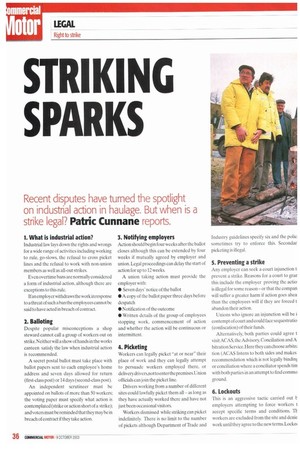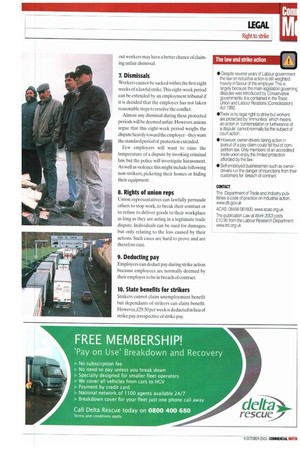STRIKING SPARKS
Page 36

Page 37

If you've noticed an error in this article please click here to report it so we can fix it.
Recent disputes have turned the spotlight on industrial action in haulage. But when is a strike legal? Patric Cunnane reports.
1. What is industrial action?
Industrial law lays down the rights and wrongs for a wide range of activities including working to rule, go-slows, the refusal to cross picket lines and the refusal to work with non-union members as well as all-out strikes.
Even overtime bans are normally considered a form of industrial action, although there are exceptions to this rule.
If an employer withdrawsthe work in response to a threat of such a ban the employees cannot be said to have acted in breach of contract.
2. Balloting
Despite popular misconceptions a shop steward cannot call a group of workers out on strike. Neither will a show of hands in the works canteen satisfy the law when industrial action is recommended.
A secret postal ballot must take place with ballot papers sent to each employee's home address and seven days allowed for return (first-class post) or 14 days (second-class post).
An independent scrutineer must be appointed on ballots of more than 50 workers; the voting paper must specify what action is contemplated (strike or action short of a strike); and voters must be reminded that they may be in breach of contract if they take action.
3. Notifying employers
Action should begin four weeks after the ballot closes although this can be extended by four weeks if mutually agreed by employer and union. Legal proceedings can delay the start of action for up to 12 weeks.
A union taking action must provide the employer with: • Seven days' notice of the ballot • A copy of the ballot paper three days before despatch • Notification of the outcome • Written details of the group of employees stopping work, commencement of action and whether the action will be continuous or intermittent.
4. Picketing
Workers can legally picket at or near" their place of work and they can legally attempt to persuade workers employed there, or deliverydrivers,not toenter the premises. Union officials can join the picket line.
Drivers working from a number of different sites could lawfully picket them all — as long as they have actually worked there and have not just been occasional visitors.
Workers dismissed while striking can picket indefinitely. There is no limit to the number of pickets although Department of Trade and Industry guidelines specify six and the polic sometimes try to enforce this. Secondar picketing is illegal.
5. Preventing a strike
Any employer can seek a court injunction t prevent a strike. Reasons for a court to gran this include the employer proving the actio is illegal for some reason — or that the compan will suffer a greater harm if action goes ahea than the employees will if they are forced t abandon their action.
Unions who ignore an injunction will be i contempt of court and could face sequestratio (confiscation) of their funds.
Alternatively, both parties could agree t visit ACAS, the Advisory Conciliation and A bitrati on Service. Here they can choose arbitn tion (ACAS listens to both sides and makes recommendation which is not legally bindini or conciliation where a conciliator spends tim with both parties in an attempt to find comma ground.
6. Lockouts
This is an aggressive tactic carried out h employers attempting to force workers accept specific terms and conditions. Th workers are excluded from the site and &rile work until they agree to the new terms. Locket out workers may have a better chance of claiming unfair dismissal.
7. Dismissals Workers cannot be sacked within the first eight weeks of a lawful strikellis eight-week period can be extended by an employment tribunal if it is decided that the employer has not taken reasonable steps to resolve the conflict.
Almost any dismissal during these protected periods will be deemed unfair. However,unions argue that this eight-week period weighs the dispute heavily toward the employer—they want the standard period of protection extended.
Few employers will want to raise the temperature of a dispute by invoking criminal law, but the police will investigate harassment. As well as violence this might include following non-strikers, picketing their homes or hiding their equipment.
8. Rights of union reps
Union representatives can lawfully persuade others to stop work, to break their contract or to refuse to deliver goods to their workplace as long as they are acting in a legitimate trade dispute. Individuals can be sued for damages, but only relating to the loss caused by their actions. Such cases are hard to prove and are therefore rare.
9. Deducting pay Employers can deduct pay during strike action because employees are normally deemed by their employer to be in breach of contract.
10. State benefits for strikers Strikers cannot claim unemployment benefit but dependants of strikers can claim benefit. However,£29.50 per week is deducted in lieu of strike pay. irrespective of strike pay
































































































































































































